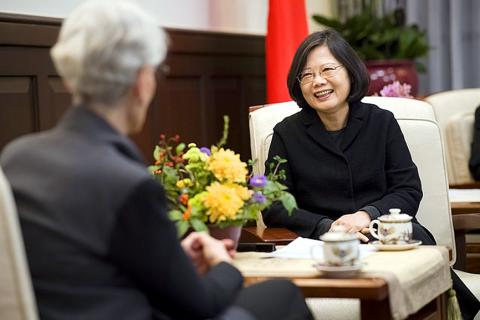President Tsai Ing-wen (蔡英文) yesterday urged unity across political lines against China as Sao Tome and Principe broke diplomatic ties with Taiwan.
The African nation’s decision to terminate ties with Taiwan, as well as changes in the international situation, pose a major challenge to Taiwan diplomatically, Tsai said at a meeting of the Democratic Progressive Party’s (DPP) Central Standing Committee at the party’s headquarters in Taipei.
“At a time of change, national solidarity across party lines is increasingly needed to fight against foreign forces,” DPP spokesman Yang Chia-liang (楊家俍) quoted Tsai as saying. “China has never stopped suppressing Taiwan’s international participation and diplomatic efforts.”

Photo: courtesy of the Presidential Office
China is behind a series of diplomatic setbacks Taiwan has faced, including the Gambia’s decision to sever diplomatic ties in 2013, the disrespectful treatment former president Ma Ying-jeou (馬英九) was subject to in Malaysia last month and Sao Tome and Principe’s announcement yesterday, Tsai said.
“As those incidents clearly suggest, China’s intervention occurs regardless of which party is in charge of the [Taiwanese] government,” she said.
China’s diplomatic isolation of Taiwan is directed against the entire population instead of specific political parties, Tsai said, adding that such practices are counterproductive to long-term cross-strait development and alienate Taiwanese.
In face of these challenges, the government must adopt a pragmatic diplomatic policy to broaden the scope of the nation’s international cooperation and improve Taipei’s relations with other nations on a mutually beneficial basis, she said.
Since Tsai was inaugurated in May, it has been the government’s top priority to increase the nation’s global presence and re-evaluate the unfair treatment the nation has been subject to, Tsai said, reiterating that the nation would not ease its diplomatic efforts.
“While divergence and conflict are common between the ruling and opposition parties, it is time we united against foreign forces to protect the national interest,” Tsai said.
Presidential Office spokesman Alex Huang (黃重諺) said Tsai met with government officials at noon to respond to the incident.
The participants included National Security Council Secretary-General Joseph Wu (吳釗燮), Premier Lin Chuan (林全), Minister of Foreign Affairs David Lee (李大維), Mainland Affairs Council Minister Katharine Chang (張小月) and central bank Governor Perng Fai-nan (彭淮南).
Huang said the president issued three instructions following the meeting: it is unnecessary for Taiwan to engage in “checkbook diplomacy” and it should maintain its stance of assisting diplomatic allies based on the principles of equality, reciprocity and mutual prosperity; that Beijing’s attempts to limit Taiwan’s international participation cause damage to the global community and cross-strait development; and finance-related government agencies should closely monitor the stock market in the aftermath of the break.
Additional reporting by CNA

SECURITY: As China is ‘reshaping’ Hong Kong’s population, Taiwan must raise the eligibility threshold for applications from Hong Kongers, Chiu Chui-cheng said When Hong Kong and Macau citizens apply for residency in Taiwan, it would be under a new category that includes a “national security observation period,” Mainland Affairs Council (MAC) Minister Chiu Chui-cheng (邱垂正) said yesterday. President William Lai (賴清德) on March 13 announced 17 strategies to counter China’s aggression toward Taiwan, including incorporating national security considerations into the review process for residency applications from Hong Kong and Macau citizens. The situation in Hong Kong is constantly changing, Chiu said to media yesterday on the sidelines of the Taipei Technology Run hosted by the Taipei Neihu Technology Park Development Association. With

A US Marine Corps regiment equipped with Naval Strike Missiles (NSM) is set to participate in the upcoming Balikatan 25 exercise in the Luzon Strait, marking the system’s first-ever deployment in the Philippines. US and Philippine officials have separately confirmed that the Navy Marine Expeditionary Ship Interdiction System (NMESIS) — the mobile launch platform for the Naval Strike Missile — would take part in the joint exercise. The missiles are being deployed to “a strategic first island chain chokepoint” in the waters between Taiwan proper and the Philippines, US-based Naval News reported. “The Luzon Strait and Bashi Channel represent a critical access

CARROT AND STICK: While unrelenting in its military threats, China attracted nearly 40,000 Taiwanese to over 400 business events last year Nearly 40,000 Taiwanese last year joined industry events in China, such as conferences and trade fairs, supported by the Chinese government, a study showed yesterday, as Beijing ramps up a charm offensive toward Taipei alongside military pressure. China has long taken a carrot-and-stick approach to Taiwan, threatening it with the prospect of military action while reaching out to those it believes are amenable to Beijing’s point of view. Taiwanese security officials are wary of what they see as Beijing’s influence campaigns to sway public opinion after Taipei and Beijing gradually resumed travel links halted by the COVID-19 pandemic, but the scale of

Pope Francis is be laid to rest on Saturday after lying in state for three days in St Peter’s Basilica, where the faithful are expected to flock to pay their respects to history’s first Latin American pontiff. The cardinals met yesterday in the Vatican’s synod hall to chart the next steps before a conclave begins to choose Francis’ successor, as condolences poured in from around the world. According to current norms, the conclave must begin between May 5 and 10. The cardinals set the funeral for Saturday at 10am in St Peter’s Square, to be celebrated by the dean of the College